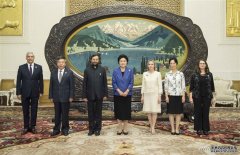China Focus: University uses click-rates to assess academic
HANGZHOU, Sept. 20 (Xinhua) -- A top university in eastern China has sparked controversy after adopting a rule to assess the works of students and teachers as academic achievements if they receive a high click-rate in online media.
According to the Zhejiang University rule, works published by major media outlets -- the People's Daily, Guangming Daily and Qiushi Journal, may be recognized as equal to publications in authoritative domestic journals if they are viewed as influential.
Works picked up by major commercial portals such as Sina, Sohu and Netease and major publications at Xinhua News Agency and China Central Television as well as on mobile apps and social media accounts, such as WeChat and Weibo, are also equal to publication in key journals if they result in significant influence.
The document also says that the works should be transmitted by no less than 10 mainstream media outlets and have more than 100,000 page views if it is on WeChat.
"Excellent Internet cultural achievements," including original articles, video and animation works, are among academic requirements for promotion or prizes.
However, the rule, which took effect in early September, has sparked debate over its feasibility and the extent to which it may devalue academic work.
Viewing the move as an exploration of academic evaluation, the university said outstanding online work would be recognized by a committee of experts in June each year.
"Given the trend of media convergence, a number of professional scholars, institutions and government departments are more willing to publish their academic works through new media first," said Zhu Wei, a communication researcher at the China University of Political Science and Law.
The academic value and influence of some online works far exceeds those of core journals, Zhu said.
Zhu Haijiu with Zhejiang Gongshang University also supported the move.
"In the era of the Internet, only recognizing publications in journals as academic output, is like only recognizing work done with brushes in the era of the pen," Zhu Haijiu said.
But others had misgivings about the rule.
"There may be some problems with the current promotion and evaluation system, but academic value should not rely on the number of clicks," said Yin Jun, a teacher at Shenzhen University in Guangdong Province.
"Papers have strict evaluation procedures, but it is hard to assess articles published on public media," said a teacher at Zhejiang University.
Zhejiang University is not the only school to explore the evaluation of online work.
Shanghai Jiao Tong University has piloted a rule that excellent Internet works can be a qualification for the promotion of certain officials. Jilin University also adopted a rule encouraging the creation of online work.
In 2013, the Ministry of Education proposed to formulate a regulation on the absorption of excellent online work when calculating academic results. In 2017, the ministry said it would advance the regulation.
"I am happy to see such an innovative measure, but I hope supervision covers the publication platforms during implementation to ensure fairness," said one web user.















